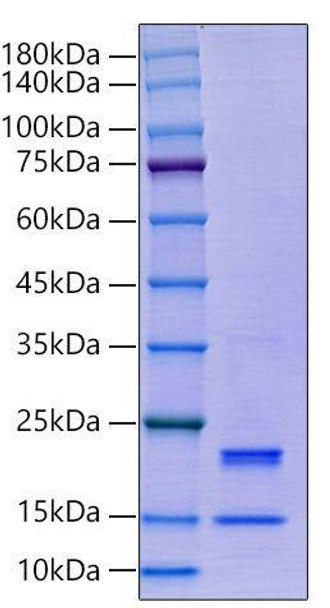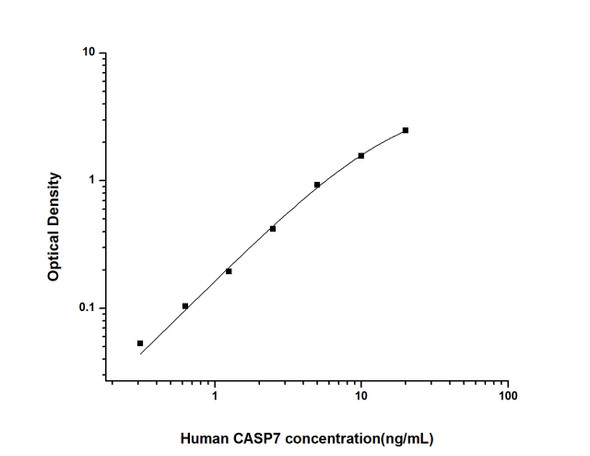Description
Recombinant Human Caspase-7/CASP7 Protein
The Recombinant Human Caspase-7/CASP7 Protein is a biologically active recombinant protein that plays a significant role in various cellular processes and signaling pathways in human biology. This protein is widely employed in immunological research, cell biology studies, protein-protein interaction analyses, and therapeutic development, providing researchers with a reliable tool for investigating Caspase-7/CASP7 function and its implications in health and disease.
This product (SKU: RPCB0109) is produced using E. coli and features a C-His tag for convenient detection and purification. The protein exhibits a calculated molecular weight of 35kDa with an observed molecular weight of 20, 11 kDa under denaturing conditions, achieving ≥ 90 % as determined by SDS-PAGE., ensuring exceptional quality and consistency for research applications.
Key Features
| High Purity by Affinity Chromatography | |
| Mammalian & Bacterial Expression Systems | |
| High lot-to-lot consistency via strict QC |
| Product Name: | Recombinant Human Caspase-7/CASP7 Protein |
| SKU: | RPCB0109 |
| Size: | 10 μg , 20 μg , 50 μg , 100 μg |
| Reactivity: | Human |
| Synonyms: | CASP7, MCH3, Caspase-7, CASP-7, EC:3.4.22.60, Apoptotic protease Mch-3, CMH-1, ICE-like apoptotic protease 3, ICE-LAP3, Cleaved into: Caspase-7 subunit p20, Caspase-7 subunit p11 |
| Tag: | C-His |
| Expression Host: | E. coli |
| Calculated MW: | 35kDa |
| Observed MW: | 20, 11 kDa |
| Gene ID: | 840 |
| Protein Description: | High quality, high purity and low endotoxin recombinant Recombinant Human Caspase-7/CASP7 Protein (RPCB0109), tested reactivity in E. coli and has been validated in SDS-PAGE.100% guaranteed. |
| Endotoxin: | < 0.01 EU/μg of the protein by LAL method |
| Purity: | ≥ 90 % as determined by SDS-PAGE. |
| Formulation: | Lyophilized from a 0.22 μm filtered solution of PBS, pH 7.4. |
| Reconstitution: | Centrifuge the vial before opening. Reconstitute to a concentration of 0.1-0.5 mg/mL in sterile distilled water. Avoid vortex or vigorously pipetting the protein. For long term storage, it is recommended to add a carrier protein or stablizer (e.g. 0.1% BSA, 5% HSA, 10% FBS or 5% Trehalose), and aliquot the reconstituted protein solution to minimize free-thaw cycles. |
| Storage: | Store at -20℃.Store the lyophilized protein at -20℃ to -80 ℃ up to 1 year from the date of receipt. After reconstitution, the protein solution is stable at -20℃ for 3 months, at 2-8℃ for up to 1 week. |
Caspase-7/CASP7 belongs to the cysteine-aspartic acid protease (caspase) family. Caspases play a role in the signal transduction pathways of apoptosis, necrosis and inflammation. There are two major classes of caspases: initiators and effectors. The initiator isoformsare activated by, and interact with, upstream adaptor molecules through protein-protein interaction domains known as CARD and DED. Effector caspases are responsible for cleaving downstream substrates and are sometimes referred to as the executioner caspases. Caspase 7 exists in lung, skeletal muscle, liver, kidney, spleen, heart, and moderately in testis. Caspase 7 cannot be detected in the brain. Caspase 7 functions in the activation cascade of caspases responsible for apoptosis execution. It cleaves and activates sterol regulatory element binding proteins (SREBPs). It proteolytically cleaves poly(ADP-ribose) polymerase (PARP) at a '216-Asp- -Gly-217' bond. Overexpression promotes programmed cell death.






